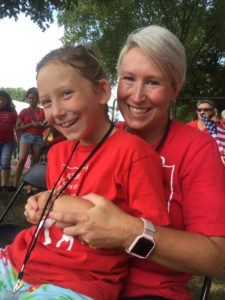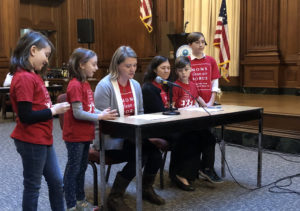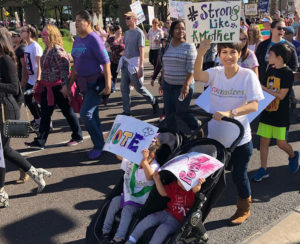By Molly Rauch, this article first appeared on Moms Clean Air Force website.
Despite massive improvements in air quality over the past several decades, air pollution is still a major problem across the country. More than 43% of Americans live in areas where the air is unhealthy to breathe. I am one of them. (I live in DC, where the air gets a failing grade for smog.)
A new report from the National Parks Conservation Association shows that the air in our national parks – a vast 85-million-acre system of 419 sites in every state, ranging from monuments to battlefields to historic sites and more – is also sub-par. In fact, 96% of our national parks are plagued with significant air pollution problems.
These are the places we take our kids to learn about our history, to get away from the city, to get exposure to nature, to get exercise – in short, these are the places we escape to for a breath of fresh air. Except in most cases, that’s not what we’re getting.
Why is air pollution on the rise? Partly it’s an outcome of the Trump Administration: Enforcement actions against polluters have plummeted, Administrator Wheeler’s EPA is pushing an anti-science agenda, and the US is exiting the Paris Climate Agreement. Partly it’s an outcome of increasing oil and gas operations in many parts of the country. The result is more polluted air, in more places.
This is changing the way we raise our kids.
The stories of our moms show how parents are dealing with air pollution and climate change each and every day, right now.

Melanie Knox Donnell with her daughter at the Play-In for Climate Action in Washington, DC, July, 2018.
Melanie Donnell lives in Springfield Missouri. Her 9-year-old daughter was born with Cystic Fibrosis, a disease that damages the lungs and digestive system. Air pollution has a major impact on her health. She can’t just leave the house and act like a normal kid. As Melanie said, “I really have to pay attention to the air quality outside and whether or not she can go outside and play.” Her daughter’s health depends on it. Indeed, Melanie describes it as “a matter of life and death.” Melanie is also a kindergarten teacher, and she sees firsthand the impact that higher temperatures caused by climate change have on her students with asthma. Hot weather days exacerbate asthma symptoms, causing her students with asthma to miss more school days than their peers. Air pollution and climate change are having significant impacts on her family and her students right now. This isn’t in some far off future.

Mollie Michel and her two daughters, left, testify at an EPA hearing in DC on reducing climate pollution from coal plants, February, 2019.
Mollie Michel (Moms Clean Air Force Pennsylvania Field Organizer) lives in Philadelphia with her husband and two daughters. One of the things that she loves about the city is its extensive parks system, from Fairmount Park to the Wissahickon, to the hundreds of neighborhood parks and playgrounds where her two daughters love to run and play. However, one thing she does not like about living in Philadelphia is the F grade for air quality that Philly receives every year from the American Lung Association. Recently, her 10-year-old wanted to sign up for a summer running program in the Fairmount Park system. Mollie knew that many of the mornings her daughter would be running would be days during which the city was under air quality alerts, potentially putting her daughter’s health at risk. So she made a tough decision: She said no. She decided that her 10-year-old will not be running in the local parks this summer. She didn’t want to take the risk of repeated exposure to dangerous air.

Columba Sainz with her children in Arizona, standing up for women’s rights.
Columba Sainz (Moms Clean Air Force Arizona Field Organizer) lives in Phoenix with her 3 small children and husband. Columba lives across the street from a park, but after her oldest daughter began wheezing, Columba began to limit the time that her children play outside. In a recent conversation, she said, “I live in a transport hub with city and school buses, airplanes overhead, trains, and freeways. I live a block from downtown Phoenix where there is a lot of construction. There’s extreme heat, which makes it all worse. Our pediatrician recommends we change filters on air filters in the home. We do this every two weeks. My daughter wasn’t born with any respiratory conditions; it’s the exposure to air pollution that she is reacting to. I can tell you the more time spent outside, the worse things get. We moved to an area with a park we cherish,” she says, “but we just can’t access it like we’d like to because of the air quality. If I want better air, I have to travel at least one hour away. This is a wealthier area, so [it’s] unaffordable for our family. This is unquestionably an environmental injustice issue for my family.”
As for me, I visit Rock Creek Park multiple times a week, and take my family to the Shenandoah mountains for special hikes a few times a year. Both of these parks have poor air quality.
These places should be our sanctuaries. They should be places we can breathe easy. The good news of course is that the same policies that can restore clean air to our national parks can help moms like Melanie, Mollie, Columba, and me find better air quality where we live. Cutting air pollution, strengthening our health-based national standards, shoring up our Environmental Protection Agency, and grounding that work in the latest science – these solutions will improve the air in our cities, in our national parks, and everywhere in between.
Reposted from Moms Clean Air Force